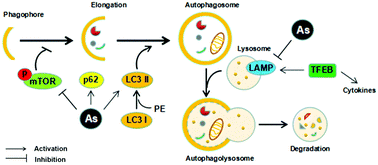Arsenic induces mTOR-dependent autophagy, whereas it impairs the autophagy–lysosome pathway and the potential role of TFEB in cultured dendritic cells
Abstract
Arsenic is a toxic metalloid, which also compromises immunity and causes various immunological disorders. Exposure to arsenic exerts the immunosuppressive properties of dendritic cells (DCs). Autophagy is a self-renewal process of cells, which degrades damaged macromolecules and organelles through the lysosomal pathway. Thus, herein, we attempt to clarify the impacts of autophagy and the autophagy–lysosome pathway on arsenic-exposed DCs. Bone marrow-derived dendritic cells (BMDCs) were exposed to different concentrations of arsenic (0.25, 0.5 and 1 μM) with or without LPS stimulation. Initially, we observed that arsenic induced autophagosome accumulation, significantly enhanced the LC3 II and p62 expressions and down-regulated the p-mTOR protein levels. We also determined that arsenic-induced autophagy occurred via an mTOR pathway. The results further revealed that arsenic inhibited autophagic flux in LPS-stimulated BMDCs using the autophagy inhibitor chloroquine (CQ). Meanwhile, arsenic significantly decreased the number of lysosomes, protein expression of lysosomal-specific markers LAMP1 and LAMP2, and the protein levels of lysosomal cysteine cathepsins (CTSD and CTSL). Moreover, the overexpression of transcription factor EB (TFEB), the master transcriptional regulator of autophagy and lysosome biogenesis, partially relieved arsenic-inhibited lysosomal CTSD and CTSL expressions, recovered the disorder of autophagic flux, promoted the production of pro-inflammatory cytokines TNF-α, IL-1β, IL-6, and IL-12, and reduced anti-inflammatory cytokine IL-10 secretion. In summary, our results support the idea that arsenic induces autophagy through an mTOR-dependent pathway in cultured BMDCs. Meanwhile, arsenic weakens the process of autophagic flux, which may be partially due to lysosomal dysfunction. Furthermore, we also suggest that TFEB can positively act on the autophagy–lysosome pathway and influence the expression of immunocytokines in DCs.



 Please wait while we load your content...
Please wait while we load your content...